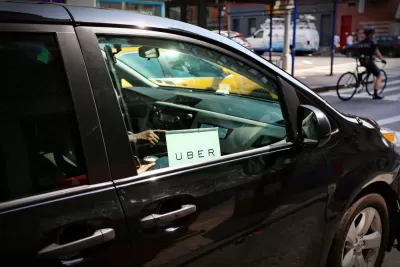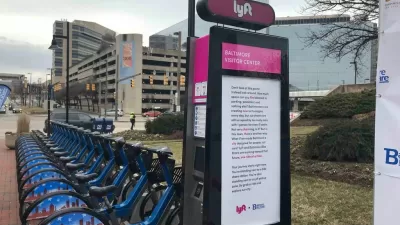A judge ruled against California's Proposition 22, which let ride-hailing and delivery businesses classify workers as independent contractors and discouraged unionization efforts.

Margot Roosevelt and Suhauna Hussain report on a decision that reopens the debate on the gig economy in California and could have lasting repercussions as ride-hailing companies seek to fight regulation in other states. Last Friday, "a state Superior Court judge invalidated a 2020 ballot proposition that allowed Uber, Lyft, DoorDash, Instacart and other app-based businesses to classify their workers as independent contractors."
Historically, "California courts are often hesitant to overturn ballot measures because the move can be seen as challenging the will of the people." But "[i]n a lawsuit brought by the Service Employees International Union and several drivers, Alameda County Superior Court Judge Frank Roesch ruled that Proposition 22 is unconstitutional and unenforceable" because it "infringes on the power of the Legislature explicitly granted by the state Constitution to regulate compensation for workers’ injuries." According to Judge Roesch, "[b]y including language aimed at preventing drivers from unionizing, the ballot measure also violates a constitutional provision that requires laws and initiatives to be limited to a single subject." Because "a ballot initiative cannot be amended after it is passed by voters, any unconstitutional provision renders it unenforceable."
"Uber and other gig economy companies spent more than $220 million last year in the nation’s costliest-ever ballot initiative campaign to exempt their drivers from a 2019 law, AB 5, requiring gig workers across many industries to be classified as employees with benefits such as minimum wage, overtime and workers’ compensation in case of injury." Uber plans to appeal the decision.
FULL STORY: Prop. 22 is ruled unconstitutional, a blow to California gig economy law

Alabama: Trump Terminates Settlements for Black Communities Harmed By Raw Sewage
Trump deemed the landmark civil rights agreement “illegal DEI and environmental justice policy.”

Planetizen Federal Action Tracker
A weekly monitor of how Trump’s orders and actions are impacting planners and planning in America.

The 120 Year Old Tiny Home Villages That Sheltered San Francisco’s Earthquake Refugees
More than a century ago, San Francisco mobilized to house thousands of residents displaced by the 1906 earthquake. Could their strategy offer a model for the present?

Ken Jennings Launches Transit Web Series
The Jeopardy champ wants you to ride public transit.

BLM To Rescind Public Lands Rule
The change will downgrade conservation, once again putting federal land at risk for mining and other extractive uses.

Indy Neighborhood Group Builds Temporary Multi-Use Path
Community members, aided in part by funding from the city, repurposed a vehicle lane to create a protected bike and pedestrian path for the summer season.
Urban Design for Planners 1: Software Tools
This six-course series explores essential urban design concepts using open source software and equips planners with the tools they need to participate fully in the urban design process.
Planning for Universal Design
Learn the tools for implementing Universal Design in planning regulations.
Clanton & Associates, Inc.
Jessamine County Fiscal Court
Institute for Housing and Urban Development Studies (IHS)
City of Grandview
Harvard GSD Executive Education
Toledo-Lucas County Plan Commissions
Salt Lake City
NYU Wagner Graduate School of Public Service





























